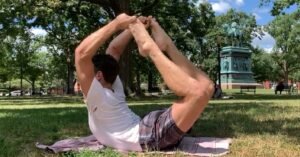Dismantling Dogma in Ashtanga Yoga By Examining Tradition: Embracing Evolution and Individual Paths
“Education as the practice of freedom affirms healthy self-esteem in students as it promotes their capacity to be aware and live consciously. It teaches them to reflect and act in ways that further self-actualization, rather than conformity to the status quo.”
Bell Hooks, in her work “Teaching Community: A Pedagogy of Hope,” beautifully encapsulates the essence of freedom in the context of education.
In the nuanced world of Ashtanga Yoga, the term “traditional” often becomes a battleground of interpretations. While it’s intended to denote practices rooted in a rich historical context, I have a growing concern about its increasing use to imply rigidity by my colleagues, often synonymously with “my way is the right way.” This conflation not only misleads but also deeply problematizes the essence of Ashtanga as a living tradition, capable of adaptation and change.
The problem with equating “traditional” with a rigid, unchanging set of practices lies in how it stifles the evolution and accessibility of Ashtanga Yoga. It overlooks the dynamic nature of the practice, historically adaptable to practitioners’ changing needs. This rigid interpretation risks alienating those who may not fit into such a framework, particularly when faced with teachers advocating stringent adherence to specific sequences without deviation.
In our practice room, where props are integrated to enhance accessibility, we confront the challenge of balancing Ashtanga’s evolving nature with traditional perceptions. Props, though sometimes viewed as deviations, align with the tradition’s spirit of adaptation. However, juxtaposing this modern adaptation against rigid interpretations of “traditional” raises significant issues, including the potential loss of key elements like the Tristana method, misapplied specificity, and cognitive dissonance due to spiritual bypassing.
Contrastingly, prop-free rooms, often considered the standard of traditional practice, offer a different perspective. While promoting focus and specificity, adhering too strictly under the guise of tradition can heighten injury risks and exclusion, potentially perpetuating a harmful narrative that Ashtanga Yoga is only for a select few.
The insistence on a singular, unchanging interpretation of “traditional” erodes Ashtanga Yoga’s inherent diversity and adaptability. It fails to honor that what is considered traditional today was once a contemporary adaptation, responsive to previous generations’ needs. This misunderstanding can lead to a homogenized practice, disregarding individual practitioners’ journeys and needs.
However, there’s significant value and empowerment in choosing a different path, especially for practitioners encountering unyielding teachers. This choice, challenging the conventional understanding of “traditional,” is a testament to the commitment to personal growth and practice understanding. Steering away from rigid approaches is not just a deviation but a reaffirmation of yoga’s core principle: the practice is for the individual.
In moving beyond narrow interpretations, recognizing Ashtanga Yoga as a living tradition is crucial. It’s not about a static set of rules but an ongoing dialogue between past teachings and present needs, allowing practitioners and teachers to contribute to its continuous growth.
Here’s the real deal, as I see it: the misuse of “traditional” to denote rigidity in Ashtanga Yoga is a fundamental misunderstanding of its essence. By embracing the fluidity of what is considered traditional, we open ourselves to a more inclusive, adaptable, and authentic experience. Practitioners who make the bold choice to practice differently become beacons of inspiration, reminding us that the true essence of Ashtanga lies not in rigid adherence to a set sequence, but in the continuous exploration and adaptation that allows the practice to be truly nourishing and life-enhancing for all.








